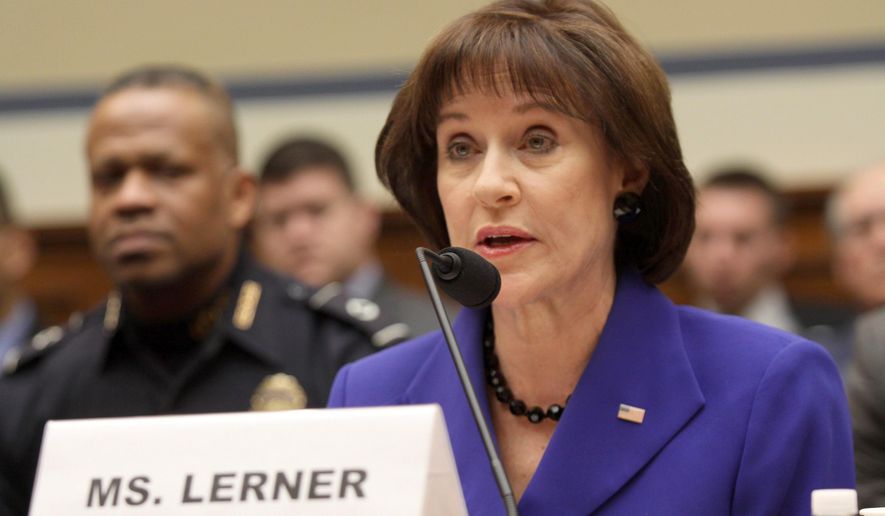A judge late Wednesday signed off on the settlement between the IRS and hundreds of tea party groups, closing out the last major legal battle over what all sides now agree was unwarranted and illegal targeting for political purposes.
The IRS agreed to pay $3.5 million to groups that were wronged by the intrusive inspections, and insists it’s made changes so that political targeting can’t occur in the future.
A few issues are still being fought over in the courts — including whether former IRS senior executive Lois G. Lerner will be allowed to forever shield her deposition explaining her behavior from public view, and whether the IRS should pay attorney fees — but this week’s decision closes out five years of litigation over the targeting itself.
“It shows that when a government agency desires to target citizens based on their viewpoints, a price will be paid,” said Edward Greim, the lawyer who led the class action case in federal court in Cincinnati.
The $3.5 million closely approximates the fines the IRS would have had to pay in damages for each intrusive scrutiny of tea party groups, had the agency been found in violation of the law. The money will be split with half going to the lawyers who argued the case and the other half to more than 100 tea party groups, which will get a cut of about $17,000 each.
Judge Michael R. Barrett called the settlement “fair, reasonable and adequate.”
The settlement doesn’t actually include an admission of wrongdoing by the IRS, though Mr. Greim and others said the payment is perhaps an even bigger mea culpa.
“I’m not frankly aware of any other class action lawsuit against the IRS for anything where the IRS paid money,” Mark Meckler, who as president of Citizens for Self Governance funded the class action challenge, told The Washington Times when the settlement was submitted for final approval several weeks ago.
Even with the settlement, however, Mr. Meckler told The Times that he still doesn’t think the IRS has improved and said he hasn’t seen any policy changes that would prevent a repeat.
“I’m a hundred percent certain it could happen again,” he said.
The IRS vehemently disputes that, pointing to former Commissioner John Koskinen’s assurances to Congress that targeting is a thing of the past.
The IRS offered a “sincere apology” to tea party groups in a case filed in federal court in the District of Columbia and the government agreed to a declaratory judgment that “it is wrong” to scrutinize a tax return because of a taxpayer’s name or political philosophy.
The targeting began in 2010 and by the time it was exposed — first when Mr. Lerner planted a question at a conference, hoping to shape the news, then in an inspector general’s report, followed by congressional investigations and the court cases — it encompassed more than 400 groups.
When they applied for tax-exempt status they were met with extensive delays and intrusive questions that the government admits never should have been asked. One group, the Albuquerque Tea Party, battled eight years before winning its status.
Most of the groups targeted were conservative, but the IRS did start adding in liberal groups as it became aware of criticism.
“What we know is that this was not a mistake, and this was not an oversight or a lack of supervision,” Mr. Greim said.
During the class action lawsuit settled this week, the tea party groups pried loose thousands of pages of documents giving the best look yet at the decision-making within the IRS. Mr. Greim said emails clearly showed Ms. Lerner being aware of the targeting in 2011 and, rather than stopping it, relabeling it and telling the auditors to keep at it.
“She put in place new processes that guaranteed even more delay,” he said.
Ms. Lerner has denied she encouraged the targeting, and a Justice Department review during the Obama administration not only cleared her, but called her one of the heroes of the saga, saying she tried to stop it.
But her full defense of her actions remains hidden.
After invoking her Fifth Amendment right to remain silent before Congress, she was deposed in the class action lawsuit, along with deputy Holly Paz. But nearly all of their testimony remains under seal because the two women say they fear death threats if the public sees what they said.
They argue that since the case was settled, there’s no value to their testimony and it’s shouldn’t be part of the judicial record.
“Returning Mss. Lerner and Paz to the media spotlight places them at risk, regardless of what they actually said in those depositions. The only way to keep this litigation from putting them in the media spotlight is to completely seal the depositions and summary judgment materials quoting them,” the women’s lawyers said in court filings.
Judge Barrett has kept everything sealed for now, but is still weighing a final decision. He held a hearing Thursday on the matter.
Ms. Lerner’s lawyers told the judge she received another threat just last week, according to Mr. Greim. But the nature of the threats is also still under seal.
The Cincinnati Enquirer newspaper, the state of Ohio and Judicial Watch, a conservative legal group, have all asked for the testimony to be unsealed.
Mr. Greim said the Justice Department had signaled earlier that it, too, supported the move, seemed to have reversed itself in court on Thursday, when a federal lawyer said they have no position on the matter.
• Stephen Dinan can be reached at sdinan@washingtontimes.com.




Please read our comment policy before commenting.